As you can see, Ham had other sons, but the curse was only upon Canaan. Why it was not upon the others, I am not prepared to say. From Canaan came the Phoenicians, the Hittites, the Jebusites, the Amorites, the Girgashites, the Hivites, etc.
From Ham’s son Cush came the Africans—the Ethopians, the Egyptians, the Libyans, etc. All of these races are Hamitic, you see. Now we have some detail regarding a son of Cush.
Genesis 10:6-20 KJV
[6] And the sons of Ham; Cush, and Mizraim, and Phut, and Canaan.
[7] And the sons of Cush; Seba, and Havilah, and Sabtah, and Raamah, and Sabtecha: and the sons of Raamah; Sheba, and Dedan.
[8] And Cush begat Nimrod: he began to be a mighty one in the earth.
[9] He was a mighty hunter before the LORD: wherefore it is said, Even as Nimrod the mighty hunter before the LORD.
[10] And the beginning of his kingdom was Babel, and Erech, and Accad, and Calneh, in the land of Shinar.
[11] Out of that land went forth Asshur, and builded Nineveh, and the city Rehoboth, and Calah,
[12] And Resen between Nineveh and Calah: the same is a great city.
[13] And Mizraim begat Ludim, and Anamim, and Lehabim, and Naphtuhim,
[14] And Pathrusim, and Casluhim, (out of whom came Philistim,) and Caphtorim.
[15] And Canaan begat Sidon his firstborn, and Heth,
[16] And the Jebusite, and the Amorite, and the Girgasite,
[17] And the Hivite, and the Arkite, and the Sinite,
[18] And the Arvadite, and the Zemarite, and the Hamathite: and afterward were the families of the Canaanites spread abroad.
[19] And the border of the Canaanites was from Sidon, as thou comest to Gerar, unto Gaza; as thou goest, unto Sodom, and Gomorrah, and Admah, and Zeboim, even unto Lasha.
[20] These are the sons of Ham, after their families, after their tongues, in their countries, and in their nations.
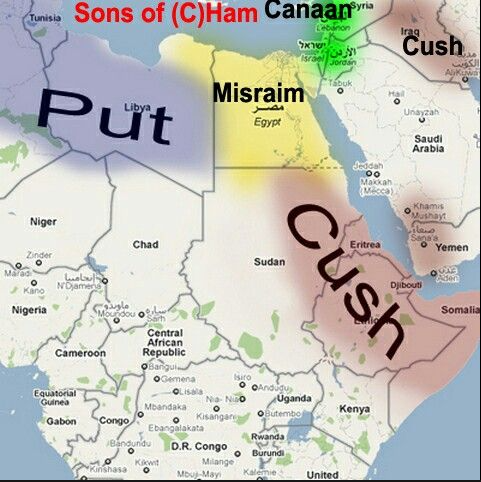
Genesis 10:6
And the sons of Ham; Cush, and Mizraim, and Phut, and Canaan.
As you can see, Ham had other sons, but the curse was only upon Canaan. Why it was not upon the others, I am not prepared to say.
From Canaan came the Phoenicians, the Hittites, the Jebusites, the Amorites, the Girgashites, the Hivites, etc.
From Ham’s son Cush came the Africans—the Ethopians, the Egyptians, the Libyans, etc. All of these races are Hamitic, you see.
Now we have some detail regarding a son of Cush—The peoples descended from Ham’s four sons, Egyptians, Babylonians, Assyrians, and Canaanites, were Israel’s most hostile neighbors. Cush was possibly in Ethiopia or ancient Nubia, Northern Sudan.
Mizraim was the ancient name for Egypt. Put was in Libya. Canaan encompassed Southern Syria, Phoenicia, and Palestine west of the Jordan River.
In Moses’ time, Egypt and Canaan were provinces of the same empire. Ham’s descendants were excluded from the blessing of Shem’s line.
Chapter 10 is sometimes called the “table of nations.” In listing the names of the descendants of Noah’s sons, it also describes the origins of the nations of the ancient world.
The previous verses named the sons and grandsons of Japheth. This verse begins a section describing the descendants of Ham and the nations that came from them.
These peoples and nations will become integral to Israel’s story and they are familiar names to this day. Ham’s first generation of sons included Cush, Egypt, Put, and Canaan. Each of their lines will be described in the following verses.
Egypt is also known as Mizraim and the original Hebrew text uses the word Misra’yim here. In ancient literature, the names of nations and their founders were often used interchangeably, such as with Edom and Esau (Obadiah 1:8–10).
Since the purpose of this passage is explaining the origins of the various ancient kingdoms, many English translations simply state this name as “Egypt.”
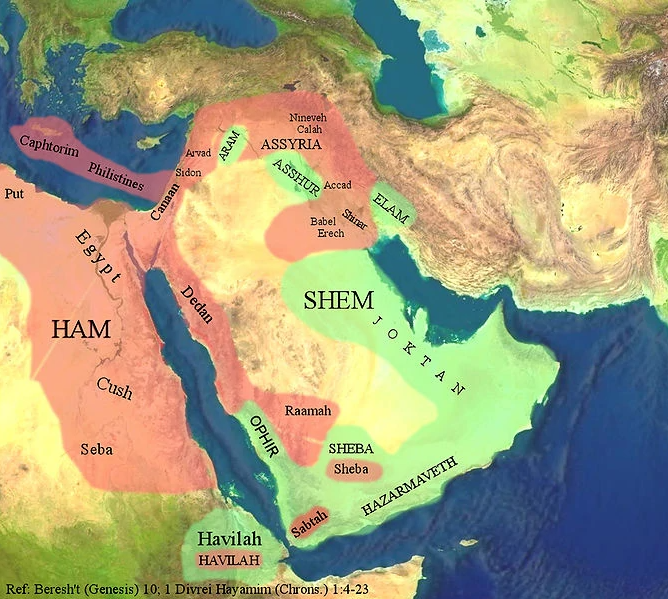
Genesis 10:7
And the sons of Cush; Seba, and Havilah, and Sabtah, and Raamah, and Sabtecha: and the sons of Raamah; Sheba, and Dedan.
The sons of Cush and Raamah together total seven.
- Seba was in northern Africa.
- Havilah was in southwest Arabia.
- Sabtah was in southern Arabia, in ancient Hadramaut, near the Persian Gulf.
- Raamah was in southwest Arabia near Najran.
- Sabteca was in ancient Samudake near the Persian Gulf.
- Sheba was a kingdom in southwest Arabia with commercial colonies.
- Dedan was in northern Arabia.
Chapter 10 is sometimes called the table of nations. In listing the names of the descendants of Noah’s sons, it is also describing the origins of the nations of the ancient world.
Earlier verses record the tribes which descended from Noah’s son Japheth. Starting in verse 6, this passage begins to detail the nations which came from Ham. This verse expands on the nations which originated fromHam’s son Cush.
Following the events surrounding the Tower of Babel described in Genesis 11, the descendants of Noah’s grandson Cush settled in Arabia and in areas of present day Egypt, Sudan, and Ethiopia.
They include Seba, Havilah, Sabtah, Sabteca, and Raamah, along with Raamah’s sons Sheba and Dedan.

Genesis 10:8
And Cush begat Nimrod: he began to be a mighty one in the earth.
“He began to be a mighty one in the earth.” He wanted to become the ruler of a great world empire, and he attempted to do it.
Special attention is given to the early history of Babylonia and Assyria, the Mesopotamian empires that would conquer and exile Israel and Judah.
The majority of this chapter is a “table of nations,” describing the origins of the various nations of the world. These are described according to their relationship to Noah and his sons.
Verses 9 and 10 represent an interesting, unique pause in that purpose. Dropped into the middle of this table of nations is a fascinating historical aside about Nimrod, one of the sons of Cush.
Initially, we’re told that Nimrod was the first on earth to become a “mighty man” or “champion,” indicating that he was a powerful and renowned ruler.
The Hebrew phrasing here can mean that Nimrod simply “began” to be mighty, or it can be interpreted to mean that he was the first person to attain that level of might.
Interestingly, in many English-speaking countries, the term “nimrod” is used to imply that a person is stupid, slow-witted, or incompetent.
Various popular artists in the 1920s and 1930s sarcastically referred to specific hunters as “Nimrod,” and popular culture eventually overtook the original implications of the term.
The follow verses give more detail about Nimrod’s exploits and accomplishments.
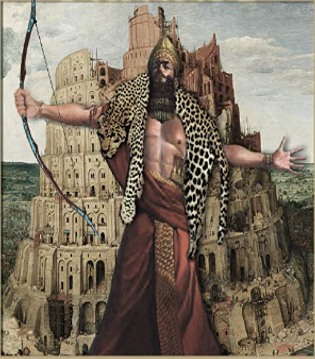
Genesis 10:9
He was a mighty hunter before the LORD: wherefore it is said, Even as Nimrod the mighty hunter before the LORD.
“He was a mighty hunter before the LORD.” This doesn’t mean that he was a wild game hunter.
Sometimes a little boy is given an air gun, and when he goes out and shoots a sparrow, his folks say, “My, look at that! He’s a little Nimrod. He hit a sparrow!”
But Nimrod wasn’t shooting sparrows or hunting wild game in Africa. He was a hunter of men’s souls—that is the thought in this passage. Nimrod attained great fame by conquest and terror; his empire extended from Babylonia in the south to Assyria in the north.
The greatest hunter in the world, literally a great hunter before the LORD, Assyrian monarchs glorified their own power, often depicting themselves as valiant hunter-conquerors.
The previous verse began an aside in chapter 10’s table of nations. It introduces Nimrod, a famous “mighty man” or “champion.” Here, Nimrod is described as a mighty hunter before the Lord.
Some scholars suggest that perhaps Nimrod is associated with the kings of Mesopotamia or Assyria, who valued hunting as a greatly honored skill. It’s unlikely that the phrase “before the Lord” means that Nimrod was faithful to the true God.
It’s more likely to mean that Nimrod was famous on the earth, where everything is before the Lord. In fact, some scholars believe that Nimrod’s skill in hunting might have led him to skill in battle, and built the basis for his success.
His name is similar to the Hebrew word for “rebellion,” and traditionally he was considered a dictator and tyrant. The nation-states founded by Nimrod, including Nineveh, Assyria, and Babel, will become some of Israel’s chief enemies.
Nimrod was so famous for his hunting skill that being like Nimrod, “a mighty hunter before the Lord,” became a common saying in the world. In the modern English-speaking world, the term “nimrod” is used as an insult, mostly to someone’s intelligence.
This is due to a series of sarcastic references in the 1920s and 1930s, which mocked an inept hunter as “Nimrod,” replacing the reputation of that name with almost the exact opposite!
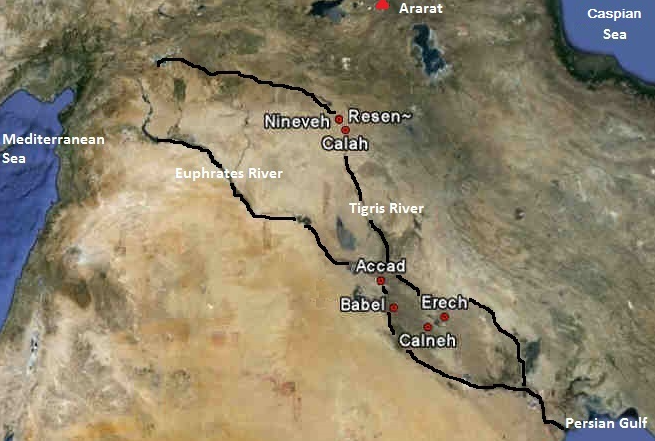
Genesis 10:10
And the beginning of his kingdom was Babel, and Erech, and Accad, and Calneh, in the land of Shinar.
Babylonia, Hebrew Shinar, is the area surrounding the Tigris and Euphrates in southern Mesopotamia. This kingdom eventually reached into northern Mesopotamia, Assyria.
Of the cities mentioned, Babylon is most important because of its role in building the Tower of Babel. Erech was ancient Uruk and is now Warka in southern Iraq. Accad was the ancient Agade north of Babylon, home of the famous ruler Sargon.
The location of Calneh is uncertain, though it is presumably one of Nimrod’s cities located north of Aram-naharaim in southern Mesopotamia. He was the founder of those great cities in the land of Shinar. Nimrod has quite a story which you can get from secular history.
Nimrod was responsible for the Tower of Babel. It was he who attempted to bring together the human race after the Flood in an effort to get them united into a nation of which he could become the great world ruler. He was the rebel, the founder of Babel, the hunter of the souls of men.
He was the lawless one, and he is a shadow or a type of the last world ruler, the Antichrist who is yet to appear.
The first great civilization, therefore, came out from the sons of Ham. We need to recognize that. It is so easy today to fall into the old patterns that we were taught in school a few years ago.
Now the black man is wanting more study of his race. I don’t blame him. He hasn’t been Truly given an equal opportunity in the past several hundred years.
The story of the beginning of the black man is that he headed up the first two great civilizations that appeared on this earth.
They were from the sons of Ham. Nimrod was a son of Ham. I’m not going to attempt to develop that line any further. You see, we are following the pattern set by the Holy Spirit in which He gives the rejected line first and then drops it.
We are going to turn now to the line that will lead to Abraham and then to the nation Israel and finally to the coming of Christ into this world. It is this line which we will follow through the Old Testament.
God is bidding good-bye to the rest of humanity for the time being, but He will be coming back to them later on.
Let me give you a quotation from Saphir’s book, The Divine Unity of Scripture:
The tenth chapter of Genesis is a very remarkable chapter. Before God leaves, as it were, the nations to themselves and begins to deal with Israel, His chosen people from Abraham downward, He takes a loving farewell of all the nations of the earth, as much as to say, “I am going to leave you for a while, but I love you. I have created you: I have ordered all your future; and their different genealogies are traced.”
In chapter 10 seventy nations are listed. Fourteen of them are from Japheth. Thirty of them come from Ham. Don’t forget that. It will give you a different conception of the black man at his beginning.
And twenty-six nations come from Shem, making a total of seventy nations listed in this genealogy. It seems to me that God is showing us what He has done with the nations of the world.
Why has the white man in our day been so prominent?
Well, I’ll tell you why.
Because at the beginning it was the black man, the colored races, that were prominent. Then the sons of Shem made a tremendous impact upon this world during the time of David and Solomon.
And you will notice that from Shem there came others, such as the Syrians, the Lydians, and the Armenians, also the Arabians from Joktan. These great nations appeared next.
Apparently we are currently in the period in which the white man has come to the front. It seems to me that all three are demonstrating that, regardless of whether they are a son of Ham or a son of Shem or a son of Japheth, they are incapable of ruling this world.
I believe that God is demonstrating this to us, and to see this is a tremendous thing.
The previous verses introduced Nimrod, famous in the world as a champion and mighty hunter. He also built a series of kingdoms for himself.
Beginning in the land known as Shinar, Nimrod established his kingdom with Babel (or Babylon), Erech, Accad, and Calneh. Traditionally, Nimrod is viewed as an early tyrant—a dictator of considerable power.
As the following verse will reveal, many parts of Nimrod’s kingdom will eventually become powerful enemies to Israel. These include kingdoms such as Assyria and Nineveh.
The city of Babel will become the focal point of the next chapter as the events around the building of the Tower of Babel unfold (Genesis 11:1–9).
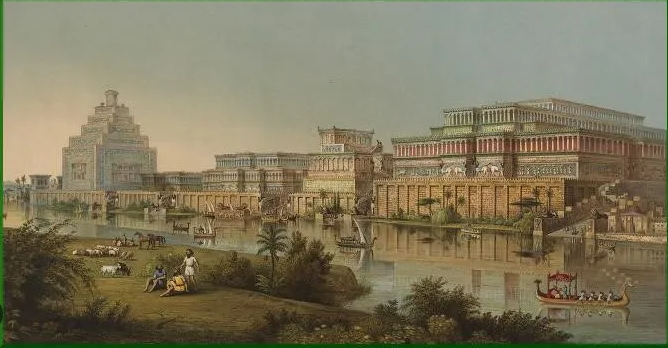
Genesis 10:11
Out of that land went forth Asshur, and builded Nineveh, and the city Rehoboth, and Calah,
From there he expanded his territory to Assyria: The Hebrew text can also be translated From that land Assyria went out.
The previous verses introduced Nimrod, one of the descendants of Ham. Apparently a great ruler of the time, he is described as a mighty hunter before the Lord.
Most traditions of the time also paint Nimrod as a tyrant, wielding great power in his lifetime. After establishing his kingdom in the region of Shinar in the south, Nimrod moved north into Assyria.
There he built the great city of Nineveh and the close-by towns of Rehoboth-Ir, Calah, and those mentioned in the following verse.
Later in Scripture, Nineveh and the Assyrians will become famous for their might, cruelty, and wickedness. God will send the prophet Jonah to take a message of salvation to the people of Nineveh; Jonah will resist.
The ruins of Nineveh remain to this day, near the modern city of Mosul in Iraq.

Genesis 10:12
And Resen between Nineveh and Calah: the same is a great city.
Resen is possibly modern Selamiyeh, northwest of Tell Nimrud. Nineveh was an ancient Assyrian city on the east bank of the Tigris River in northern Iraq. Calah is modern Tell Nimrud, south of Nineveh.
This verse concludes the biographical aside about Nimrod in chapter 10’s table of nations. Nimrod, a descendant of Noah’s son Ham, was a mighty man who established a kingdom of his own in the regions of Shinar and Assyria.
The previous verse revealed that Nimrod established the “great city” of Nineveh in Assyria, along with several other cities. Resen, mentioned in this verse, is the final of Nimrod’s cities to be mentioned.
The name Resen likely meant “fountainhead,” and the city may have been situated on the Tigris river.
In the future, Nimrod’s descendants will become some of Israel’s greatest enemies. They will also be directly involved in some of the Old Testament’s most unfortunate incidents.
Among these, as seen in the next chapter, is the incident at the Tower of Babel (Genesis 11:1–9).
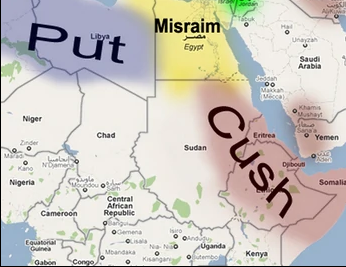
Genesis 10:13
And Mizraim begat Ludim, and Anamim, and Lehabim, and Naphtuhim,
The Ludites were Lydian tribes west of the Nile delta. The identity of the Anamites is uncertain. They were possibly Egyptians near Cyrene, west of Egypt. The Lehabites were possibly a Libyan tribe. The Naphtuhites inhabited northern Egypt.
Genesis 10 presents a table of nations, describing the descendants of Noah’s three sons, where they settled following the Tower of Babel, and what nations developed from their family lines.
After an aside to describe the life of a mighty man named Nimrod who established his kingdom in Assyria, the chapter returns to the pattern with this verse. Ham’s sons included Cush, Put, Canaan, and Egypt (or Mizraim).
In the original Hebrew, this particular son’s name is Misra’yim. Some English translations use Mizraim here.
The Hebrew Old Testament, however, always refers to the nation of Egypt using the word Misra’yim, both in Genesis and the story of the Exodus. For this reason, many translations simply use “Egypt” to avoid confusion.
Mizraim’s / Egypt’s sons are listed here and in the following verse.
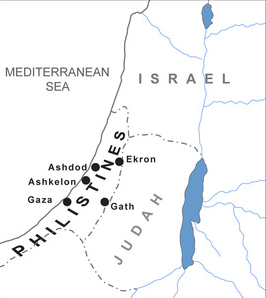
Genesis 10:14
And Pathrusim, and Casluhim, (out of whom came Philistim,) and Caphtorim.
The Pathrusites inhabited southern Egypt.
Casluhites, and the Caphtorites, from whom the Philistines came, Hebrew text reads Casluhites, from whom the Philistines came, and Caphtorites, The Casluhites possibly inhabited an Egyptian district also known as Cyrenaica.
The Philistines from Crete were sea people who lived intermittently in southwest Canaan during the period of the Exodus and later. They were among Israel’s most troublesome enemies during the early monarchy.
The Caphtorites were Cretans.
This and the previous verse list the sons of Egypt (or Mizraim). In Old Testament Hebrew, the only word used for this person, or the nation who came after him, is Misra’yim.
This later became the nation of Egypt, and since that his how typical English speakers define that land today, most modern English translations stick to “Egypt” whenever this term arises.
Egypt was one of the sons of Ham, the son of Noah. Following the Tower of Babel, the descendants of Egypt generally settled in and around the lands that make up what would become known as the great nation of Egypt.
Israel’s relationship with Egypt would be long and complicated. Early on, they would be kind and supportive to the people of Israel (Genesis 50:1–14), but this would soon turn into subjection and slavery (Exodus 1:1–14).
Israel would also have a long and conflicted relationship with the Philistines, though there is some question as to whether the Philistines mentioned here are the same ones Israel fought in the time of David.
Many scholars believe that this passage refers only to the Philistine people passing through an area, not necessarily originating in it.
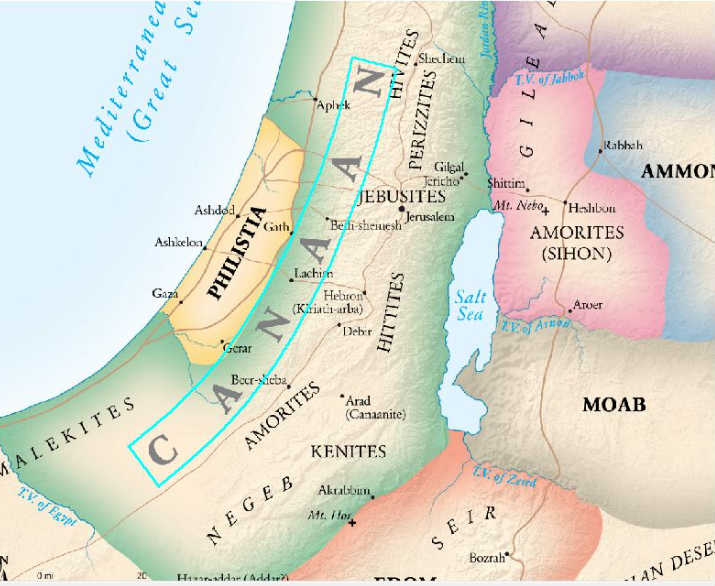
Genesis 10:15
And Canaan begat Sidon his firstborn, and Heth,
Sidon settled in Phoenicia, north of Canaan.
Hittites, Hebrew Heth, The Hittites in Genesis were a coalition of cities within Canaan. They were probably not the same as the Hittites of Anatolia, Asia Minor, whose empire was one of the great empires of antiquity during the patriarchal period.
Genesis 10 contains a table of nations, a description of how the descendants of Noah’s sons became the peoples of the ancient world. After detailing the descendants of Ham’s other sons, this verse begins a listing of the sons of Canaan.
These sons will become the Canaanites, the peoples who occupied the Promised Land before the nation of Israel arrived to claim it under the direct orders of God (Exodus 3:17).
The evil of these Canaanite nations would become so severe that Israel was used as God’s instrument of judgment against them (Deuteronomy 9:3–6).
Canaan’s firstborn son was Sidon. The city of Sidon (Judges 1:31; Acts 27:3) is one of the oldest in the region of Canaan.
Canaan’s son Heth has a connection to the Hittites, but apparently not a direct connection to the great nation of the Hittites that would arise later (Exodus 13:5; Judges 1:26).
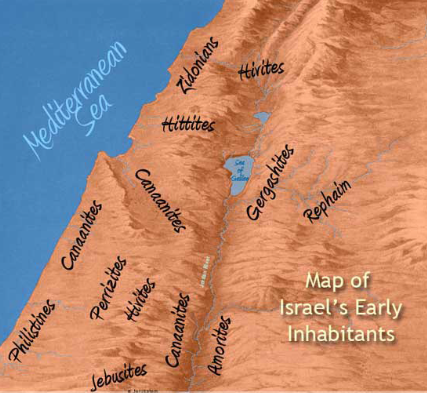
Genesis 10:16
And the Jebusite, and the Amorite, and the Girgasite,
The Jebusites were ancient inhabitants of Jerusalem.
The Amorites lived throughout the mountains of Palestine in Canaan.
Little is known of the Girgashites, a Canaanite tribe.
This verse continues a list of the sons of Canaan, Noah’s great-grandsons through his son, Ham. These sons of Canaan will become the Canaanites, the peoples occupying the Promised Land, which the people of Israel will come to conquer after the Exodus from Egypt (Exodus 3:17).
Unfortunately, while other nations had their flaws, the Canaanite peoples would become especially wicked. This, more than anything else, is what motivates God to send Israel as a form of judgment (Deuteronomy 9:3–6).
This flows from the curse given to Canaan by Noah, on account of Ham’s dishonoring of his father (Genesis 9:20–25).
Verse 16 mentions the Jebusites, the Amorites, and the Girgashites. The Jebusites settled in what would later become the city of Jerusalem (Judges 1:21; 1 Chronicles 11:4).
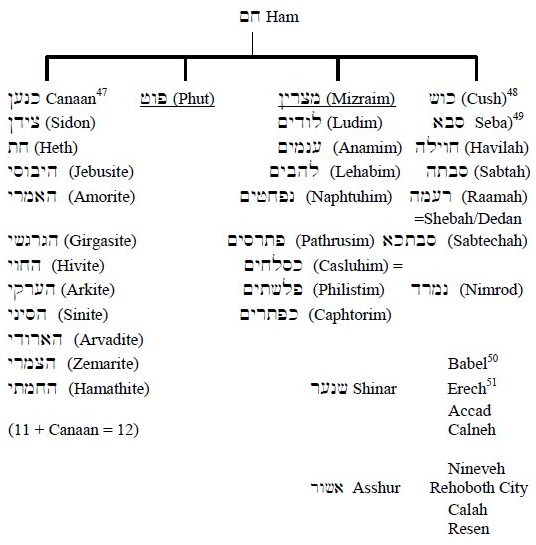
Genesis 10:17
And the Hivite, and the Arkite, and the Sinite,
The Hivites were an uncircumcised Canaanite tribe.
The Arkites resided in Tell ’Arqa in Lebanon.
The Sinites formed a city-state and inhabited Phoenicia.
Canaan was a son of Ham, a son of Noah. This passage lists the descendants of Canaan, most of whom would go on to become great enemies of the nation of Israel.
These Canaanites go on to occupy the Promised Land which the people of Israel will conquer after the Exodus from Egypt (Exodus 3:17).
In chapter 9, Noah’s son Ham gravely dishonors him, resulting in Noah placing a curse on Ham’s son, Canaan (Genesis 9:20–25). Over time, the Canaanite people would sink further and further into evil and depravity.
By the time Israel was freed from Egypt, as told in the book of Exodus, God was prepared to send judgment.
This came in the form of Israel, who was allowed to conquer the land of Canaan, not because of their own merit, but in order to punish the sins of Canaan’s descendants (Deuteronomy 9:3–6).
Verse 17 mentions the Hivites, the Arkites, and the Sinites, groups that apparently settled mostly in the north.
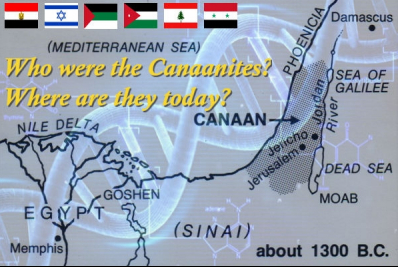
Genesis 10:18
And the Arvadite, and the Zemarite, and the Hamathite: and afterward were the families of the Canaanites spread abroad.
The Arvadites inhabited Ruad in northern Phoenicia, near the El Kebir River. They were known for shipping.
The Zemarites inhabited Sumur, modern Sumra, north of Arka on the Phoenician coast.
The Hamathites founded what is now Hama on the Orontes River, the northern boundary of Canaan.
This verse continues a list of the sons of Canaan, Noah’s grandson. These sons of Canaan will become the Canaanites, the peoples occupying the Promised Land which the people of Israel will come to conquer after the Exodus from Egypt.
This later conquest is God’s judgment on the sins of the Canaanites (Deuteronomy 9:3–6), and a partial fulfillment of the curse levied against Canaan by Noah (Genesis 9:20–25).
Verse 18 lists the final three groups stemming from Canaan, each of which became a city-state in the north.
Arvad is a small island city off the coast of Syria, also known as Ruad Island. The Zemarites lived in the city of Sumur, which may have been just south of Arvad.
Hamath is in west central Syria today, called Hama. The people of that city served Israel’s kings David (2 Samuel 8:9–10) and Solomon (2 Chronicles 8:4), and the city was later retaken by Jeroboam (2 Kings 14:28).
This is one of many examples of the fulfillment of Noah’s curse from Genesis 9 that the descendants of Canaan would become servants to the descendants of Shem (Genesis 9:26).
This verse ends with the statement that the clans of the Canaanites dispersed. This may refer to the dispersal to the region of Canaan after the events of the Tower of Babel described in Genesis chapter 11.
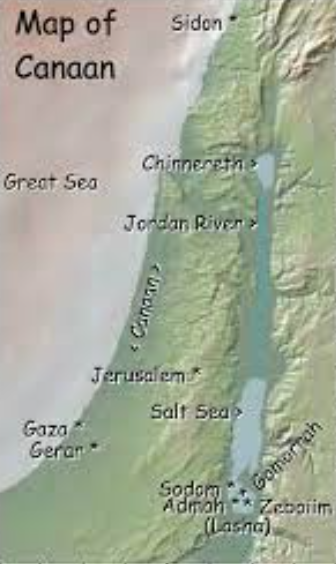
Genesis 10:19
And the border of the Canaanites was from Sidon, as thou comest to Gerar, unto Gaza; as thou goest, unto Sodom, and Gomorrah, and Admah, and Zeboim, even unto Lasha.
The territory of Canaan is specifically marked off because it would be taken from its inhabitants and given to Israel. An ancient north-south seacoast highway, the Via Maris, extended from Sidon . . . to Gerar, connecting Egypt to Mesopotamia.
Modern Gaza is 11 miles northwest of Gerar. Sodom and Gomorrah were cities on the border of the land southeast of the Dead Sea.
Admah and Zeboiim are mentioned 15 times in connection with Sodom and Gomorrah. All four cities were destroyed by God to cleanse the land. Lasha was possibly in the northern region of the Dead Sea.
This verse defines, in loose geographical descriptions, the approximate borders of the land occupied by the Canaanites. The description of this territory will become important later in Israel’s history.
God will give the region of the Canaanites to the people of Israel. It will become the Promised Land (Exodus 3:17), and Israel will move into it, conquer its peoples, and take possession of the land and its cities.
Some of the Canaanite clans listed in the previous verses will be wiped out; others will become servants to God’s people Israel. This is partly due to the curse Noah levied against Canaan in Genesis 9:20–25.
It is also due to the extraordinary evil which Canaan’s descendants participated in (Deuteronomy 9:3–6).
Sodom and Gomorrah will become so well known for their wickedness that their names will become shorthand for depraved evil. God’s judgment on them is described in Genesis 19.
Genesis 10:20
These are the sons of Ham, after their families, after their tongues, in their countries, and in their nations.
Satan will do his best to place the enemies of your soul within your promised possession, just as he ultimately placed these enemies in the Land of Israel, who greatly opposed the people of God.
This verse wraps up the section describing the lines of Noah’s son Ham as they dispersed and established themselves following the events described in chapter 11.
Most genealogies in Genesis follow a long, history-spanning line of fathers and sons. The lists given here in chapter 10, however, are meant to be broad.
Rather than tracing through time, this “table of nations” shows how the sons of Noah fathered all the tribes and peoples of the ancient world.
Ham’s sin against Noah resulted in a curse (Genesis 9:20–25). However, Ham’s descendants would become an important people group in the region.
Some, in particular the Canaanites, will participate in great wickedness, and God will cause them to be conquered by His people Israel (Deuteronomy 9:3–6). The following verses will describe how the people of Israel will come from the line of Noah’s son Shem.
I hope that you have really enjoyed this post,
Please Leave All Comments in the Comment Box Below ↓













It’s remarkable to witness the threads of our collective past intertwining and shaping the mosaic of civilizations throughout time.
Your insightful research and eloquent storytelling have sparked a profound appreciation for the diverse narratives that have shaped our world.
Thank you for opening our eyes to the profound beauty of our shared human journey, and reminding us of the importance of embracing our interconnectedness.
Hello Dave,
Thanks for stopping by and commenting on another episode of HBS & DwJ Podcast.
I am pleased to have assisted in sparking a profound appreciation for the diverse narratives that have shaped our world.
You are welcome for the insightful research, as well as, the opening of eyes, and the importance of embracing our interconnectedness.
Blessings To You My Friend!
Hello,
Prior to reading this article, I did not have knowledge of the Sons of Ham or the origin of Nimrod.
One takeaway is Nimrod was a great hunter.
Though, what did Nimrod do with men’s souls?
What attaining more souls achieved, is not clear in the text.
Hello Godwin,
Thank you for taking the time to comment on this information.
As far as I have read in The Holy Bible, Nimrod, known in Egypt as Osiris, was the founder of the first world empire at Babel, later known as Babylon (Genesis 10:8-12; 11:1-9).
He was a hunter of men’s souls—that is the Thought in this passage, which means, Nimrod attained great fame by conquest and terror; his empire extended from Babylonia in the south to Assyria in the north.
The greatest hunter in the world, literally a great hunter before the LORD, Assyrian monarchs glorified their own power, often depicting themselves as valiant hunter-conquerors.
Thanks again for commenting.
Blessings My Friend!
Hello once more.
As you can see, only Ham’s sons were cursed on Canaan: the Phoenicians, Hittites, Jebusites, Amorites, and Hivites.
Ethopians, Egyptians, and Libyans came with Ham’s son, Cush.
I quote:
“Cush, Mizraim, Phut, and Canaan are Ham’s sons.
Cush fathered Nimrod, the Lord’s powerful hunter.
His Shinar kingdom began at Babel, Erech, Accad, and Calneh. Asshur founded Nineveh, Rehoboth, and Calah, while Mizraim fathered many tribes.
Canaan fathered Sidon, Heth, Jebusite, Amorite, Girgasite, Hivite, Arkite, Sinite, Arvadite, Zemarite, and Hamathite.
From Sidon to Gerar, Gaza, Sodom, Gomorrah, Admah, Zeboim, and Lasha, the Canaanites spread.
Ham’s sons came from their families, languages, countries, and nations.”
It is always amazing to read the old stories about how people disrespected God’s ways and commands and suffered because they did not listen.
As we can see, Ham had other sons, but the curse was only on Canaan.
Thank you for a great article,
Elke
God Bless You Always!
Hello again Ingrid,
Thank you for continually stopping by, utilizing your valuable time to read, understand, and comment on this episode of HBS & DwJ Podcast.
Your appreciation for this information is very valuable indeed. I always enjoy learning more of God’s view of us, His creation. I find it to be particularly interesting, so thank you for seeing He, who is in me.
You are most certainly welcome for the great article, andI appreciate you appreciating this episode as great.
Thank you again for your continued support with helping HBS & DwJ spread GOD’s Word.
Blessings To You Always, As Well My Friend!
This article is really interesting!
It touches on the ancient cultures and peoples associated with Ham from the Bible and reveals interesting aspects of history and anthropology.
I was fascinated by the discussion of different ethnic groups and their historical context. Exploring the origins of African, Egyptian, Ethiopian, and Libyan peoples provides a deeper understanding of their cultural roots and importance in human history.
This article is sure to encourage many readers to think more deeply about their past and cultural ties.
Great job!!! 🌍📚
Hello Again Steve,
Thank you for continuing to comment on this website.
I appreciate your continued appreciation for this information, because each comment adds additional value to what is already here.
Don’t forget to check out the HBS & DwJ Podcast, and you can also pick up merchandise at the HBS & DwJ Store.
Please feel free to continue to stop by and share your thoughts on other information on this HBS & DwJ website anytime, your perspective is definitely welcomed.
Blessings My Friend!
This article seems to delve into the genealogy and history of various nations and peoples that descended from Ham, one of Noah’s sons.
It appears to discuss the descendants of Ham, including individuals like Cush and Mizraim, who played significant roles in the development of ancient civilizations. You also touch on the curse placed upon Canaan, the son of Ham, and how this affected the different nations that emerged from Ham’s lineage.
Given my limited understanding of this topic, I’m curious about the significance of this genealogy and why the curse was placed specifically on Canaan. It seems like this article is exploring connections between these ancient nations and the biblical narrative, and I wonder how these historical accounts relate to broader themes in religious texts or historical records.
Bless you.
Hello again skamalka,
Thanks for continuing to stop by the HBS & DwJ website, turned podcast to comment on additional episodes.
While some have thought Ham’s viewing of Noah was sinful, or that Ham did something perverse, the Bible seems to indicate that it was Ham’s mocking response of telling his brothers that was wrong.
Rather than respecting his father, Ham apparently took some delight in the Drunk Noah’s lack of dignity at that moment, and he shared his disrespect with his brothers.
Your opinion on this topic, as well as all of the others you comment on, is very much appreciated.
Blessings To You As Well My Friend!